Gisburne House Children's Home, Watford, Hertfordshire
In the mid-1960s, Islington Borough Council opened a children's home at Gisburne House, 95 Gammons Lane, Watford. The property had previously been used for many years by London County Council as various forms of girls' accommodation.
The following memories of Gisburne House have been kindly contributed by Sheila Pyke who worked there for a period in 1968.
I went to work at Gisburne House, Watford as a Trainee Assistant Housemother in February 1968 when I was 17 years old. It was a very large, rambling house in its own grounds in Gammons Lane, Watford, and at that time it was a "Reception and Remand Centre" for up to 40 children aged 3 to 17, owned by the Islington Council.
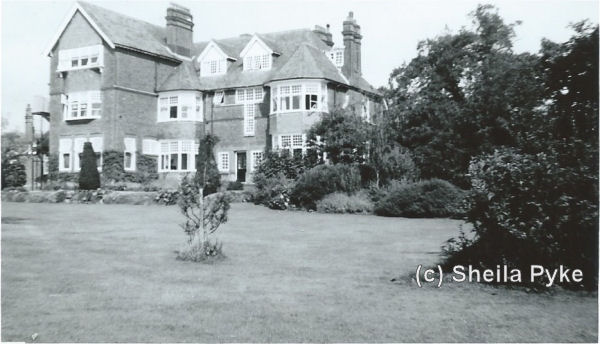
Gisburne House, Watford, 1968. © Sheila Pyke
The married couple in charge were Mr. and Mrs. Smith and I remember them as being very kind. From memory, there were four other permanent staff, one male and three female. There was another full time trainee besides myself and several other students came and did short placements as part of their courses in nursing, social work and nursery nursing. The staff worked a 5½ day week on a rota system to cover the weekends. I was assigned to the youngest children, the under sevens, who we called "The Tinies". We started work at 7am and finished at 9pm, probably later if you worked with the older children. We had two hours off either in the morning or the afternoon. A half day started at 2pm, after you'd cleared up after lunch.
I and the other trainee attended Southwark College on Thursdays and Fridays in term time to do a Certificate of Attendance in Residential Childcare. One of the main tutors was our own Mr. Smith.
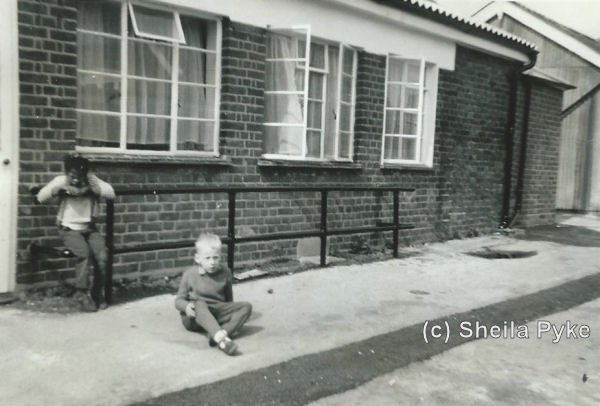
Gisburne House, Watford, 1968. © Sheila Pyke
We had lectures about child development and abnormalities such as "maladjusted children" and "educationally subnormal children." They talked about 15 year old "prostitutes" and we were taught that autism is caused by cold, unresponsive mothers and that children were always better off with their parents than in a Home. I found it all very interesting, even though much of what we were taught then would be considered ill-informed and just plain wrong now. I don't recall any writing, handouts, reading lists or assignments, although notes in a diary I wrote a few years later showed that I did a special study on youth work, so perhaps there was more to it than I remember. The only other lesson I recall was cookery.
I earned about £11 a week, less £2 or £3 for my board and lodging. As a comparison, the rent, rates and water rates for my parents' council house in Langley, near Slough, was then £3-18-0d a week.
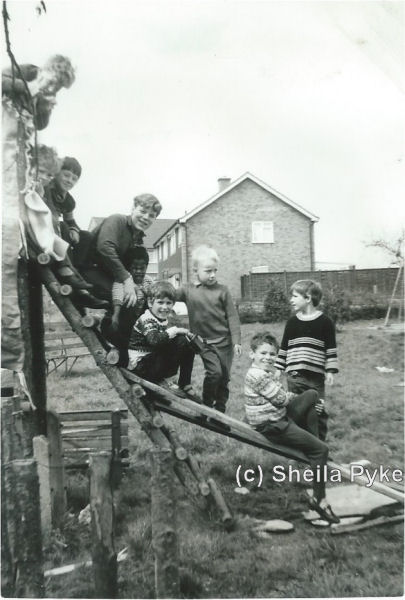
Gisburne House, Watford, 1968. © Sheila Pyke
The permanent staff had rooms in the main house, and presumably had to deal with any incidents that happened during the night. We two trainees shared a three bedroomed bungalow in the grounds, the third bedroom occasionally being occupied by other students. It had a bathroom and lounge but no kitchen. We were allowed to help ourselves to any food we wanted when we were off duty from the kitchen in the main house.
Our day started with getting the children up and changing any wet beds. We all ate our meals together in the big dining room. A cook was employed, although we had to take turns to wash up — there was no dish washer, so it was very hard work and took ages. The food was better than I'd been used to at home, and mealtimes were an introduction to me to such middle class niceties as water jugs, butter knives and side plates. The only main meal I can remember was rissoles (which I loved) and at the weekends tea would be "bread and spreads." I remember having to cook 40+ boiled eggs for everyone's breakfast once and they were all underdone!
On my very first day, one of the little girls had to be admitted to hospital with measles. I had to go with her in the ambulance and do my best to answer questions about her personal and medical history, of which I knew nothing. Then I had to find my way back to Gisburne House on the bus. The children were generally admitted in an emergency when they were first taken into care, although most of the Tinies were there when I arrived and stayed till after I left eight months later.
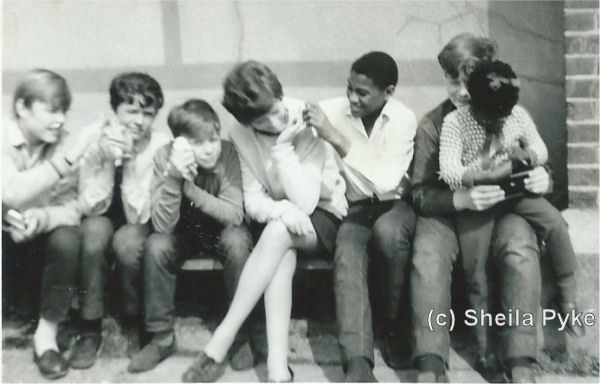
Gisburne House, Watford, 1968. © Sheila Pyke
There was more coming and going amongst the teenagers, who were usually admitted because of truanting from school and because their parents couldn't control them.
During the day the older children had lessons in the Home's school room, but we used to take the little ones to the local infant school. The pre-schoolers stayed with me and the House Mother.
There was a small play room with a blackboard in it, but I don't remember many toys. We seemed to spend most of the time outside in the grounds, where there was some play equipment, a sand pit and some pets.
A lady was employed to do the children's washing and sometimes her twins joined us. Our jobs included mending clothes and putting them away once washed. Their clothes were bought from Marks and Spencer's, a shop my parents could certainly not afford to use.
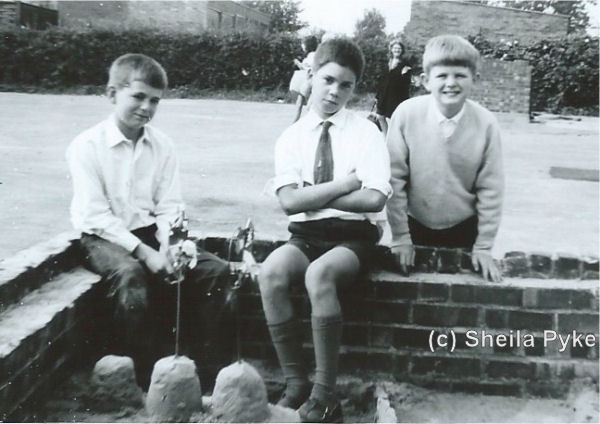
Gisburne House, Watford, 1968. © Sheila Pyke
At the end of the day we got the children ready for bed and took turns to sit in the doorway of the dormitory they all shared, reading them a story till they all fell asleep. By the end of a 14 hour day I was usually exhausted and my nerves were often jangling from incidents I'd witnessed or dealt with. Strangely, I can't remember anything specific with the younger children — no tears, tantrums or arguments — but I do remember scenes with the older ones that usually involved a lot of shouting and swearing and throwing furniture around. I have no memories of any punishments.
In the evenings we'd watch television with the older children. They also had a record player and a table tennis table, and a hut in the grounds was designated as a Boys' Club — I've no idea what they did in there.
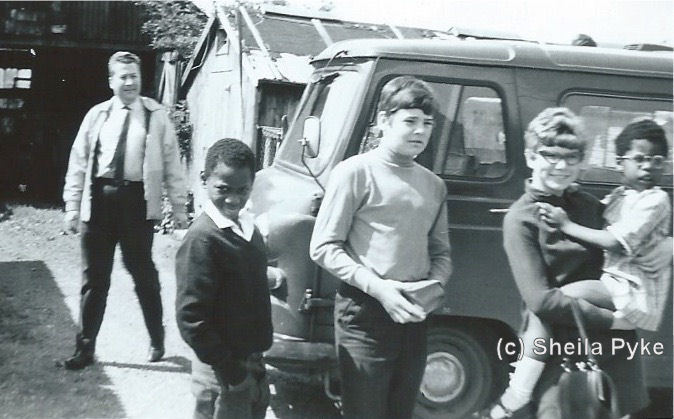
Gisburne House, Watford, 1968. © Sheila Pyke
Although I was mainly involved with the youngest children, I also sometimes had to escort the older ones if they wanted to go out to spend their pocket money (on sweets), as they weren't allowed to go on their own. There were often instances of the teenagers absconding during the night, and I was always worried about what I'd do if they tried to give me the slip — bearing in mind I was only 17 or 18 myself.
We took the small children out a lot during the week, usually just around the local neighbourhood although there was one day when I was given some money to take one little girl out for the day on my own. We went across London to the Bethnal Green Museum of Childhood. I enjoyed it, but I don't know how much she got out of it ( apart from the individual attention).
On Sundays we went out in the Home's minibus, usually driven by Mr. Smith, to places like Cassiobury Park, Whippendell Woods, Dunstable Downs and on one occasion to a farm. He obviously couldn't take all 40 children so I don't really remember how they decided who was going. Some of the children and staff went on holiday to Scarborough.
I was on duty at Easter when all the children were given an Easter egg, but I went home at Christmas so I don't know how that was celebrated. I do remember having parties with the children and dancing to records, but I don't recall any birthdays. No-one went to church, as far as I remember, but we did say grace. I don't think any of the small children had any contact with their families, and maybe not any memories of them that they could vocalise.
One of the things I was allowed to do if we weren't busy was to go into the office and read the children's records. Many of them had had a terrible start in life and I was very distressed by what I was reading. I remember some of their stories vividly.
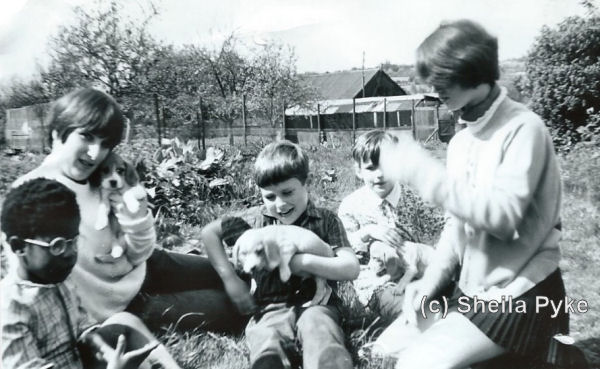
Gisburne House, Watford, 1968. © Sheila Pyke
My course was supposed to last six months but as they hadn't had time to complete all the lectures, we returned to Southwark College in September for a few weeks. Then the other trainee and I had to move on to other Homes to work as qualified House Mothers to make room for the next pair of trainees. I didn't want to leave as I found Gisburne House a happy place to work.
I was sent to Copthorne in Enfield, a very small Home which was also run by Islington Council. Something upset me about that Home; after nearly 50 years I can't even remember what it was now. It certainly involved some kind of cruelty on the part of the House Parents, or perhaps my perception of it. There was one other member of staff who told me a lot of stories which may or may not have been true. The only strange fact I definitely remember was that I had to do the children's washing in a twin tub washing machine and I wasn't allowed to rinse the detergent out.
After about three weeks I went home on my day off and decided not to go back. I called Islington council from a call box to report what I saw as ill-treatment and got a very negative and unhelpful response. I had sent for information about training to be a teacher while I was still at Gisburne House and decided to apply when I left Copthorne. I went on to work in nursery teaching, parent education and training childcare workers until I retired.
Sheila Pyke (née Clack)
In more recent times, there have been allegations of abuse taking place at the home dating back to the late 1970s and 1980s, particularly during the tenure of a superintendent named Geoffrey Wylde-Jones, now deceased.
Records
Note: many repositories impose a closure period of up to 100 years for records identifying individuals. Before travelling a long distance, always check that the records you want to consult will be available.
- Chief Information Officer, Information Governance, Islington Council, Room G17, Town Hall Upper Street, Islington N1 2UD. Email: foia@islington.gov.uk
Bibliography
Links
- None noted at present.
Except where indicated, this page () © Peter Higginbotham. Contents may not be reproduced without permission.


